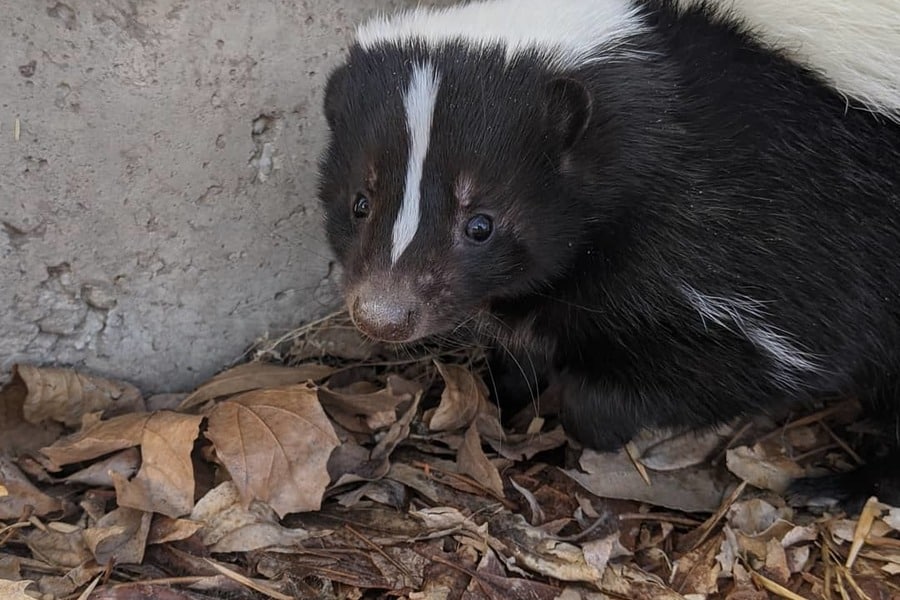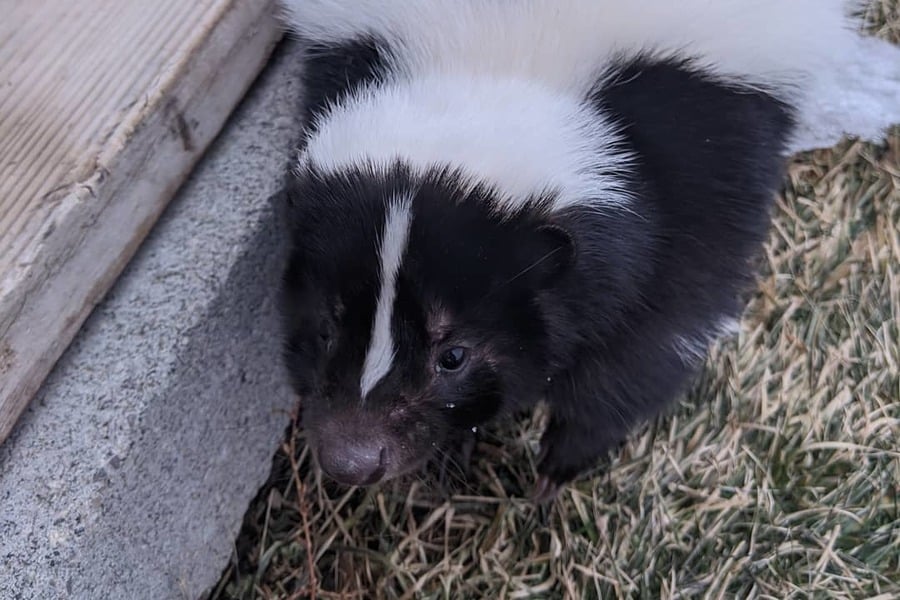If you have skunks and are wondering how to get rid of a skunk under the deck, I will tell you which methods and ways to use to keep skunks away from your territory. I have compiled this comprehensive guide to explain how skunks choose where to live and how to tell for sure if a skunk or another pest has made its way to you. You will also learn if skunks are dangerous and which harm they can do to your property.
[wpsm_titlebox title=”Skunk Infestation 101″ style=””main””]
1. Cover your waste.
2. Secure your property with a wire mesh fence.
3. Sprinkle kitty litter nearby.
4. Use cotton swabs soaked in ammonia.
5. Make your area well-lit.
6. Use mothballs and vinegar that have a sharp odor.
[/wpsm_titlebox]
How Do You Know If You Have a Skunk Den?

Skunks are usually not aggressive, but they can harm you by making a hole or trying to have baby skunks. That’s why you have to get rid of them before they spray you. These pests build their homes in pre-existing burrows looking for a place with a clean entrance. Finding their shelter is not difficult. You will find it by a persistent smell of their excrement and fur, as well as traces of garbage.
Skunks leave footprints that are just as easy to identify. They have 5 fingers and leave claw marks on their tracks. If you see a lot of holes in your area, this means that they have been looking for larvae and their den is not far from this place. Skunks are nocturnal animals, so you are unlikely to see them during the day.
How to Get Rid of Skunk Under Deck: Step-by-Step Guide
There are many ways to get rid of a skunk living under the deck. You can also prevent the pest from appearing on your territory. There are a lot of professionals you can call to help you catch a skunk, but I will tell you simple methods that you can use against it. These methods will not cause you any difficulties, and they are quite effective.
You can force a skunk to leave its place of residence in the most humane way, without harming it or being sprayed. I’ll tell you about such methods as vinegar, naphthalene, and everything with a pungent smell. You can use these remedies to make skunks unwilling to stay in your place and leave it soon. The methods I provide here are effective at catching them and making sure the pests won’t come back. Hopingly, this brief guide will help you learn more about skunks.

Step 1: Make skunks leave
If you think that skunks have found a path to your yard, you need to react quickly before they move in. Install a wire mesh fence to keep skunks out of the property. You need to set up such nets in places that pests can consider a good place to live in. Try to cover up all the cracks and spaces that they can climb into.
When they see no way to get to attractive places, pests are less likely to try to get there. This will prevent skunks from appearing or keep them working hard before they get to your property. Also, don’t forget to cover trash cans and take out the garbage, as they can identify your area as a food source. Pet food can also attract their attention, so try not to leave food or anything that might draw them to your territory. Skunks tend to settle in places where food is already available.
You can hear skunks under the deck as they scurry around and make enough noise to be noticed. You can identify their burrow by the strong smell of skunk poop. They don’t poop in one place but leave their excrements everywhere they go. Since these are nocturnal animals, it might be challenging for you to see them. If you notice where they have made their way, try to install an underground wood panel or sheet metal fence as soon as possible. This way, skunks do not return there next time. This measure will force them to look for another place to live.

Step 2: Ways to get rid of skunks
If you have skunks under the porch or house and need to get rid of them, read these methods to get rid of them. The ways I provide here won’t cause them harm, and they also don’t require much effort from you. The following methods are effective for dealing with them:
- Scatter the cat litter around the place where they have settled. Throwing cat litter within this area will cause skunks to leave their habitat, as it is a mild repellent. You only need to place the filler in a single place to allow the pests to get out and leave your household. Then you can seal their entering place to prevent skunks from coming back again.
- Moisten cotton balls with ammonia and place them near the holes. Skunks are afraid of the smell of ammonia. As soon as they smell it, they are forced to leave this place. Wetting rags or cotton balls in ammonia and placing them near the entrance will scare them away in case they try to enter your territory again.
- Install motion-sensitive nozzles. This sprinkler is great for dealing with skunks. When pests are within the range of its work, it automatically starts spraying liquid, thus scaring them away. All you have to do is put it in a place where you think skunks are. This item is easy to install and is harmless to both animals and humans.
- You can use apple cider vinegar and place it in a plastic bag. Like ammonia, apple cider vinegar also has a strong odor that helps to repel skunks. Dampen the rags, put them in a plastic bag, and locate them near the entrance to the den so that skunks do not climb back into the hole.

- The urine of predators such as dogs and foxes also deters skunks. You can purchase urine and spray it on the spot where you saw a skunk, or you can just spray it all over the area.
- Use mothballs in the neighborhoods where skunks live. This solution has a pungent and frightening smell to skunks. A few mothballs situated in the place where they have settled will make pests leave it as soon as possible. The odor of mothballs goes away in a couple of weeks. The same naphthalene remedy can be applied to places they frequent for food. However, naphthalene can harm children and pets, so you need to choose a spot to place it carefully.
- Set up lights to scare predators away. Since skunks are nocturnal, they try to avoid bright lights. The lights react to movement, and when a skunk makes its way toward you, it will scare them away. Nightlights can also be a good alternative.
- A spray repellent is ideal for dealing with pests such as skunks. The strong mint formula is suitable for both internal and external use. You can spray this product anywhere where skunks can be: in the basement, on the lawn, etc. You can also add piperine and capsaicin in black pepper oil granules. These granules protect your territory and repel pests for 30 days.
- To get rid of them, you can use traps. By using them, you can catch skunks without causing them harm. However, you should consider traps as the last measure because there is a chance to separate pests from their offspring and thereby harm these skunks. You can install a small trap near the hole, luring skunks with cat food or peanut oil. You have to check the trap every day. When a skunk falls into the trap, it is necessary to take it away from the den at a distance of more than 10 miles. However, you have to be careful with the animal, as it can spray or bite you. Before spraying, a skunk warns you by raising its tail, hissing at you, and turning its back in your direction.

Some skunks can even stand on their paws. If you see such a warning, slowly back away from the pest without scaring it. Dogs and cats might ignore the warning, so don’t let them get too close to a skunk as it can defend itself and spray your pet. When choosing a trap, give preference to models with a spring-loaded metal door, which closes when the animal enters the cage. The inside of the cell should have smooth edges so as not to injure a skunk.
Skunks are notorious for giving off a stinky odor. If it splatters on you, it is unpleasant, especially if it gets into your eyes.
Step 3: Time to call a professional
If the problem is serious enough for you, and you cannot deal with it on your own, you can always call a professional. You shouldn’t hesitate to address a pro if you think a skunk is rabid. The specialist will safely fish the skunk out from its hiding place under your deck and release it elsewhere. Professionals know how to deal with newly born skunks, and how to get rid of offspring and a female skunk without separating them. Though their services can be somewhat costly, they can save you a lot of nerves and effort and help you forget about the skunks in your area as soon as possible.

FAQ About Skunks
In this guide, I have told you how to prevent skunks and how to deal with them. Now you know which methods are most effective against them. Let’s answer some common questions about these pests.
Where do skunks go during the day?
Many people are interested, “Are skunks nocturnal?” Although they spend most of their time in dens during the day, they can also be active at that time. However, they are careful so as not to attract your attention.
Do skunks return to the same place?
From the end of summer, these pests rarely stay in one place. They are likely to leave the place and migrate elsewhere. However, they can come back in early spring.
Can skunks dig through concrete?
Skunks have large, strong claws that allow them to dig into concrete slabs and porches or damage lawns. So the answer is “yes,” they can burrow into concrete slabs and cause damage to your property.
Get Rid of Skunks in Your Yard
I have mentioned numerous ways to get rid of skunks or prevent them in this guide, and all of them work. I have told you in detail how to deal with skunks and what harm they can do to you, your property, and your pets. Hopingly, now you will manage to determine if a skunk has wound up in your area.
Also read:
- Can Skunks Climb a Fence
- How to Get Rid of a Skunk in Your Yard
- How to Scare a Skunk Away
- Do Mothballs Keep Skunks Away
- Best Skunk Baits in 2022
- How to Stop Skunks From Digging up Lawn
- Home Remedies for Keeping Skunks Away
- Do Skunks Live Underground
- What Sound Does a Skunk Make
Have you found my guide helpful? Tell us which methods you used if you ever met a skunk in your yard. What can you recommend to deal with pests? Which methods did you use?

